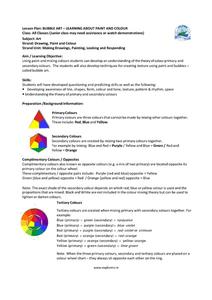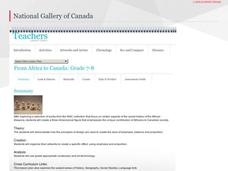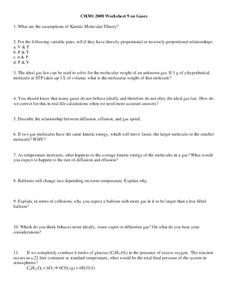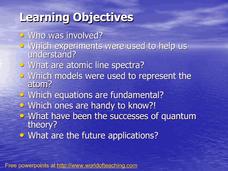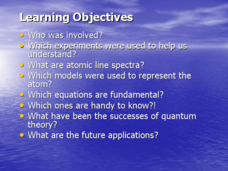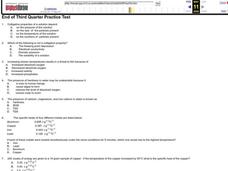Curated OER
da Vinci: Body Proportion Theories
Middle schoolers investigate the validity of da Vinci's proportion theory by recording human measurements on scatter plots. In groups of three, they record each other's height and wingspan to create a Powerpoint presentation, chart, or...
Science Geek
Kinetic Molecular Theory
The fourth presentation in a series of five begins with information about the nature of gases and what to expect from them. Then it discusses kinetic molecular theory, diffusion, and Graham's Law, and concludes with the purification of...
Curated OER
Early Atomic Theory Homework
For this early atomic theory worksheet, students answer 4 questions about the Law of Definite Proportions, the Law of Conservation of Mass and Dalton's Laws. Students are given 5 statements to determine if each true statement supports or...
Curated OER
One Size Fits All, Part 1
Can you tell how tall someone is just by looking at their feet? In this activity, young mathematicians measure their height, arm span, and foot size, graph their findings, and answer questions about how these measurements are related....
Curated OER
What are Atoms?
In this atom worksheet, students read about Dalton's contributions to the structure of the atom. They answer five questions about Dalton's ideas, the law of multiple proportions and the law of definite proportions.
Urbana School District
Thermodynamics
Entropy, it isn't what it used to be. Presentation includes kinetic-molecular theory, heat and internal energy, thermal equilibrium, temperature scales, laws of thermodynamics, entropy, latent heat of fusion, specific heat, calorimetry,...
Marine Institute
Bubble Art – Learning About Paint and Color
To gain an understanding of color mixing theory and the color wheel, young artists draw a picture, mix up a batch of secondary colors to which they add dish soap, and using straws, bubble up the paint. They then press their drawings onto...
Curated OER
Probability & Game Theory
Learners explore the concept of probability. In this probability lesson, students perform various probability experiments including flipping a coin, picking m&m's out of a bag, and the birthday problem.
Curated OER
Practice Final
A full-fledged practice final prepares pupils for their general chemistry final exam. If they complete these 57 multiple-choice questions correctly, they will be well-prepared. Note: even though the questions are multiple-choice, there...
National Gallery of Canada
The Ideal Trophy
Invite your pupils to represent a club, team or other group with a trophy of their own creation. Learners examine the Taylor Cup by Laurent Amiot and then prepare trophy designs. When the sketches are complete, pupils sculpt the final...
National Gallery of Canada
From Africa to Canada
Represent the African diaspora with figurines. Using a discussion on the contributions of people of African descent as inspiration, class members prepare sketches of a figure and put together a small sculpture from those sketches.
National Gallery of Canada
Tantalizing Tessellations!
Examine repeating and intricate patterns with a study of M.C. Escher and a related art activity. Pupils view and discuss the artwork before creating their own tessellating patterns. Step-by-step instructions for creating a template are...
Brigham Young University
Understanding Design, Composition, and Color
The set for a play combines design elements (style, line, shape, mass, measure, position, color, and texture) and principles of composition (unity, harmony, contrast, variation, balance, proportion, and emphasis) to create a particular...
Mr. E. Science
An Introduction to Matter
What's the matter? Gas, solid, liquid, or plasma. The presentation covers how to describe and identify matter, changes in matter, types of matter, measuring matter, particles of matter, Democritus, and John Dalton's Atomic Theory.
Virginia Department of Education
Acid-Base Theory
Litmus paper, why so blue? A chemistry activity includes a pre-lab activity, practice calculating pH, an experiment measuring the pH in acids and bases, a titration demonstration, and a titration experiment.
Curated OER
Gases
In this gases worksheet, students review the kinetic molecular theory and use the ideal gas law to solve 20 problems.
Curated OER
Atomic Theory, Structure, and Symbols
In this atomic theory learning exercise, students review the observations that led to the conclusion of the atom having a positively charged nucleus. Students compare atomic number and mass number and explain how the discovery of...
Curated OER
Reaction Kinetics and Rate Laws
In this reaction kinetics worksheet, students draw a graph of energy vs. reaction progress and determine the factors which change the speed of a reaction. Students learn about rate laws. This worksheet has 1 graph, 15 fill in the blanks,...
National Gallery of Canada
Taken Out of Perspective
Art does not always have to look perfectly realistic. Play with proportion and shape by stretching images. Pupils study works of art by Picasso, Cézanne, and Monet before selecting a photograph to adapt. They use a distorted grid to...
Curated OER
Quantum Mechanics
Mostly what you will find here is a history of quantum mechanics. Influential scientists are introduced (along with some of their recorded quotes), the progression of atomic models is reviewed, and finally experssions and equations are...
Curated OER
The Who's Who of Quantum Physics
This wonderful recap of powerful figures in scientific history includes pictures, important dates, and the information about their inventions or impact. Atomic structure and the photoelectric effect are introduced. The first slide gives...
Curated OER
The Human Head and Picasso
Sixth graders view human head paintings by Picasso. Using the paintings, they identify the facial proportions by a frontal and profile view. With a partner, they create a portrait of them after observing and measuring their face. They...
Curated OER
Modern Physics, QM
For this physics worksheet, students examine the theory of quantum mechanics through the answering of the nine questions. The answers are accessed through the links by each question.
Curated OER
Solutions
In this solutions worksheet, pupils determine colligative properties, calculate specific heat, and review the kinetic theory as it applies to gases. This worksheet has 8 multiple choice and 9 problems to solve.








